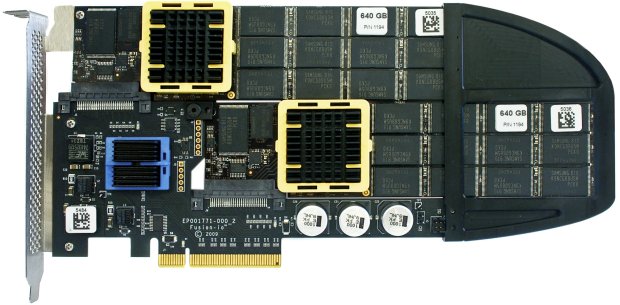The Fusion-io ioDrive Duo is an impressive storage device, it offers sustained read speeds of 1500MB/s and sustained write speeds of 1400MB/s, along with 186,000 read IOPS, 167,000 write IOPS and latencies of under 50 µseconds. The storage device also has chip-level N+1 redundancy, on-board self-healing and optional RAID-1 mirroring between two ioMemory module son the same ioDrive Duo.
The ioDrive Duo will be available in April 2009 in 160GB, 320GB and 640GB capacities. A 1.28TB version will follow in the second half of the year. The drives support PCI Express x8 or PCI Express 2.0 x4.
Fusion-io, the leader in solid-state architecture and high-performance I/O solutions, today announced the ioDrive Duo, which doubles the slot capacity of Fusion-io’s successful PCI Express-based ioDrive storage solution. The new ioDrive Duo is the market’s fastest and most innovative server-based solid-state storage solution.Pricing wasn't disclosed, but these SSD cards are obviously not cheap.
With the ioDrive Duo, it is now possible for application, database and system administrators to get previously unheard-of levels of performance, protection and capacity utilization from a single server. Performance for multiple ioDrive Duos scales linearly, allowing any enterprise to scale performance to six gigabytes per-second (Gbytes/sec) of read bandwidth and over 500,000 read IOPS by using just four ioDrive Duos.
“Many database and system administrators are finding that SANs are too expensive and don’t meet performance, protection and capacity utilization expectations,” said David Flynn, CTO of Fusion-io. “This is why more and more application vendors are moving toward application-centric solid-state storage. The ioDrive Duo offers the enterprise the advantages of application-centric storage without application-specific programming.”
